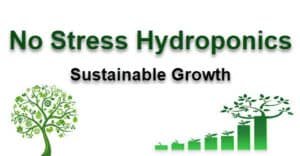Do you have an interest in hydroponics, but not sure how much light you need to provide your plants? Have you ever wondered how much light do hydroponic plants require for optimum growth?Hydroponic gardening is becoming increasingly popular among home growers. This soil-less growing method promotes rapid growth of healthy plants using only water and a nutrient solution.
Hydroponic systems come in all shapes and sizes, from large commercial operations to small home systems. In order for your system to be successful, it is important to understand the role of light in plant development.
Photosynthesis is one of the most important processes for maintaining life on Earth, as it allows plants to convert energy from sunlight into chemical energy that fuels their growth. Here’s what you need to know about how much light do hydroponic plants need!
What Is Hydroponics?
Hydroponics is an innovative method of growing plants without the use of soil. This type of gardening uses nutrient-rich water solutions to provide essential nutrients to the plants, allowing them to thrive in any environment. Hydroponic systems come in many forms, from simple home set-ups to complex commercial operations. By using hydroponics, you can create healthy, vibrant plants without the use of soil.
How Much Light Do Hydroponic Plants Require?
The amount of light required by your hydroponic plants will depend on the type of plant and the size of your system. Generally speaking, most plants require between 6 to 8 hours of light per day in order to survive and thrive. However, many varieties need more than 8 hours of light to thrive. It is important to research the specific requirements of your plants before setting up your system.
A great way to ensure that your hydroponic plants are receiving enough light is to set up an automatic lighting system. This will allow you to program a timer and provide the exact amount of light needed for optimal growth.
Benefits of Growing Hydroponic Plants
Growing hydroponic plants has several advantages over traditional soil-based gardening. Hydroponic systems are extremely efficient and can save space, water, and energy compared to traditional growing methods.
Additionally, because hydroponic plants are grown without soil, they tend to be healthier and more productive than their soil-based counterparts. Because of this increased productivity, you can harvest more crops in a shorter amount of time than with soil-based gardens.
Hydroponic gardens can be tailored to the specific needs of each plant, allowing you to achieve the desired results quickly and efficiently. As hydroponic plants are grown without soil, they are also much more resistant to pests and diseases, making them easier to care for.
Furthermore, hydroponic systems require significantly less water than soil-based gardens, reducing water waste and helping conserve resources in the long run.
Another great benefit of hydroponics is that it can be done inside, making it possible to grow plants in climates where they would otherwise not survive. This makes hydroponic gardening ideal for those living in cold climates or areas with limited access to sunlight.
Types of Lights Suitable for Growing Hydroponically
When it comes to growing plants hydroponically, the type of lighting you use is just as important as the amount. Different types of lights provide different spectrums and intensities, which can affect the growth of your plants. Here are some of the most common types of lights suitable for growing hydroponically:
LEDs: LED lights are a popular choice for hydroponic gardens due to their energy efficiency and ability to provide a full spectrum of light.
Fluorescent Lights: Fluorescent lights are a great option for hydroponics as they are widely available, affordable, and produce very little heat.
High-Intensity Discharge Lights: High-intensity discharge lights such as metal halide and high-pressure sodium provide intense light that is ideal for large-scale operations.
Understanding Light Requirements for Different Types of Plants
It is important to take into account the specific light needs of different plants when setting up your hydroponic system. Some plants, such as lettuce and kale, require between 8 and 12 hours of light per day while other plants, such as tomatoes and peppers, need at least 14 hours of light per day.
Knowing the exact requirements of each plant can help ensure that they are getting the right amount of light for their optimal growth.
It is also important to make sure that your plants are getting the right type of light. LED lights are often used in hydroponic systems as they provide a good balance between efficiency and affordability.
Setting Up an Appropriate Lighting System
Setting up an appropriate lighting system for your hydroponic garden is essential for healthy plant growth. The type of lighting system you choose will depend on the size of your garden and the type of plants you are growing. A larger system may require more powerful lights, while smaller gardens may be able to get by with less powerful bulbs.
Additionally, if you are growing certain types of plants that require specific light spectrums, such as red or blue LED lights, you may need to purchase specialized bulbs.
Finally, it is important to make sure that your lighting system is set up correctly and that the lights are positioned in such a way that they are providing the right amount of light for optimal growth. Setting up an automated timer can also help ensure that your plants are getting the correct amount of light throughout the day.
Conclusion
Hydroponic plants require light to grow, and it is important to understand the specific needs of each plant in order to set up an appropriate lighting system. Automated timers and LED lights are a great way to ensure that your plants are getting the right amount of light for optimal growth.
By understanding the exact requirements of each plant, you can set up an efficient, cost-effective hydroponic garden that will provide you with healthy, abundant harv ests.
